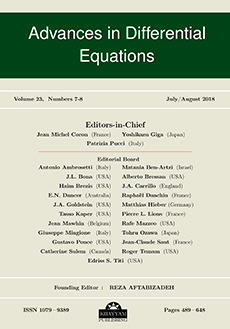V. A. Galaktionov, P. J. Harwin
Adv. Differential Equations 10 (6), 635-674, (2005) DOI: 10.57262/ade/1355867838
KEYWORDS: 35K55, 35K15, 35P30, 37L99, 76S05
We consider the porous medium equation (PME) $$ u_t = \Delta (|u|^{m-1}u) \quad \mbox{in ${{\mathbb R}^N} \times {{\mathbb R}^N}_+$}, \quad m>1, $$ with continuous, compactly-supported initial data $\hat{u}$. The PME admits various similarity solutions of the form $$ u_k(x,t)= t^{-{\alpha}_k} \psi_k(x/t^{{\beta}_k}), \quad k=0,1,..., $$ where each $\psi_k \in C_0({{\mathbb R}^N})$ satisfies a quasilinear elliptic equation in ${{\mathbb R}^N}$ and the exponents $\{{\alpha}_k,{\beta}_k\}$ are determined from the solubility of such a nonlinear eigenvalue problem. The nonlinear eigenfunction subset $\Phi=\{\psi_k\}$ consisting of a countable number of continuous families is rather complicated and is known in one dimension and in the radial setting in ${{\mathbb R}^N}$ (in ${{\mathbb R}^N},$ for $N \ge 2$, only the first two eigenfunctions from $\Phi$ are known). We show that the eigenfunction subset $\Phi$ can be evolutionary complete, i.e., describes the asymptotics of arbitrary global $C_0$-solutions of the PME. We prove such a completeness in one dimension and in the radial ${{\mathbb R}^N}$ geometry. The analysis uses Sturm's theorem on zero sets for parabolic equations, scaling techniques, and the theory of gradient dynamical systems. For $m=1$, i.e., for the linear heat equation, the evolution completeness is directly associated with the completeness and closure of the eigenfunction subset for the linear self-adjoint operator $\Delta + \frac 12 y \cdot \nabla + \frac N2 I$ in a weighted $L^2$-space. These linear eigenfunctions are used as branching points of nonlinear ones for $m \approx 1^+$.

